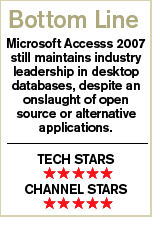Review: Fending Off Office Killers

To be fair, suites like Google Docs offer quick and easy word processing and some spreadsheet functionality that gives the Redmond, Wash.-based software giant a run for its money. With that in mind, the CRN Test Center wanted to provide a close look at Access 2007, the $229 Microsoft desktop database that received a major upgrade in this recent version over Access 2003 and which comes included in Office 2007. To be a true Office Killer, other suites will have to find a way to take on Access 2007.
First, reviewers looked at the competitors: Kexi is an open-source desktop database that is free to download and is cross-platform—that is, it runs in Windows XP or Vista, Mac OS X and Linux. It's available for download at www.kexi-project.org, and bills itself as "Microsoft Access for Linux." The Test Center looked at it: It's not. It wouldn't install on a system with a 64-bit version of Windows Vista Ultimate, and can only install on Ubuntu or other Gnome versions of desktop Linux by employing sudo administration because it is written to the K Development Environment (KDE). Reviewers did get Kexi installed and running on a 32-bit version of Windows Vista and it did offer a friendly user interface with the ability to create tables, queries, forms and reports. Kexi allows for the creation of blank databases, importation of existing databases or the creation of an address book database from a template. Other templates—for customer records, inventory and the like—were not evident. Want to create a macro for Kexi? You can, but you'll need to deploy a script that enables a program written in the Python object-oriented programming language. It's got a built-in SQLite database engine and is capable of connecting to MySQL and PostgreSQL. Overall, it's a rudimentary, lightweight desktop database, meaning you get what you pay for.

OpenOffice.Org 2.3 provides the Base desktop database. Base is built on the HSQLDB database engine, written in Java, and it provides a nifty set of wizards to create tables, forms, queries and reports. OpenOffice.org has a few advantages over Access: It's free, its license doesn't limit an enterprise as to how many seats can be rolled out to individual clients and like Kexi, it's cross-platform. However, while Base provides a number of wizards to take the end user through the creation of tables, forms, queries and reports, and while Base does provide levels of customization, there's no quick, easy mechanism to create or build macros. Base does allow for the management of macros, and the ability to organize them by programming language (python, beanshell, javascript and OpenOffice.org basic). But basic levels of programming knowledge are required to build macros in Base—a potential time sink that, depending on the enterprise, could drain value from the ROI equation very quickly.
In fact, with Base, it takes about twice the number of clicks to create a table and run a report as it does in Microsoft Access 2007—a noteworthy efficiency gap. That could give Microsoft an edge when it comes to ROI that many enterprises and workgroups are now making a priority. It's not that Base is bad software and it's not that it isn't well-organized. But it simply fails in areas where Microsoft excels, and those are areas where solution providers can make a compelling case for cost savings. Consider this: If it takes a $20-an-hour office worker 15 fewer minutes a day to tabulate data and run a report in Access 2007 than it does in Base, that efficiency means that the cost-of-acquisition of Microsoft Office easily pays for itself in just a matter of months over the cost-free software suite. And that's just with one application.
Mileage, as the saying goes, may vary. Each enterprise is like a fingerprint—no two are exactly alike. But on the whole, count on Access to offer significant efficiency in both customization and workflow, not to mention cost of deployment across a Microsoft-ready enterprise.
So where does Access 2007 soar? Its features are defined and marked clearly in the workspace, navigating between features is easy and wizards are available in every feature. It's possible to create a macro in about a minute using a macro wizard. In Access 2007, table fields can store attachments (think about PDF versions of expense receipts, for example) and for the solution provider, it's easy to deploy. Microsoft provides marketing, technical and financial support to solution providers, while OpenOffice.org or Kexi's KDE development community don't even come close to that level of support.
For example, Kexi's online documentation is expansive but much of it is clearly written by those whose primary language isn't English. For solution providers based in the U.S., that could be an issue.
While Access 2007 and the rest of Office won't work in Linux, if an enterprise has already opted to standardize on Linux for the client, it's most likely for reasons that have little to do with office (small "o") productivity, or a desktop database simply isn't a thought.
For now, Office Killers won't find Microsoft's Achilles' heel by looking at Access. At press time for CRNtech, the K Desktop Environment was set to launch KDE 4.0, of which Kexi is a part. But while the community continues to work to upgrade and improve it as part of an overall desktop productivity solution which is free (or "libre"), it continues to trail Access by a significant distance in performance and functionality.